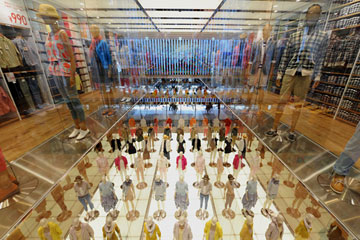
Uniqlo's flagship in Tokyo. The company aims to have 200 outlets in the U.S.
(2 of 4)
Inevitably, success has made an icon of the iconoclast: Yanai is one of the best- known Japanese business leaders since Akio "Walkman" Morita, Sony's charismatic CEO during the country's economic heyday in the 1980s. It has also made him the loudest advocate for change in Japan Inc., one who exhorts other companies to rediscover their entrepreneurial zeal by sweeping away the consensus-based decisionmaking and social niceties that sap initiative and creative thinking. "Other Japanese companies advocate globalization, but some of them want to retain their conventional practices," he says. "Each one of us needs to embrace the concept of 'change or die,' [or] there will be no future for us."
The mantra isn't new: management experts have been preaching it to Japanese firms, mostly in vain, for nigh on two decades. But Yanai is a more credible messiah. As the first Japanese brand to break big internationally in decades, Uniqlo represents hope for a return to the nation's golden period, when the likes of Sony, Panasonic, Toyota and Honda had the cachet now enjoyed by Apple and Samsung. Whereas other Japanese CEOs might hesitate to make grand declarations, Yanai says he wants Uniqlo to join the pantheon of Japanese superbrands: "We want to become No. 1 in the world."
Yanai says his fellow businesspeople can create new globe-girdling successes if they embrace the nothing-to-lose spirit that characterized post--World War II Japan. "After the war, people had the guts to go abroad and establish their brands," he says. "Out of the rubble, Sony and Honda started to tap into the rest of the world. So did Panasonic and Toyota." He likens the country's recent economic gloom--Japan was overtaken by China in 2010 as the world's second largest economy--to the pall that hung over it in the 1950s but sees that as a chance for renewal: "This is another opportunity to stand up against defeat."
Yanai's call to action isn't very welcome in the halls of the major corporations, where managers who slaved their entire lives crawling up the corporate ladder are deeply invested in the current bureaucratic systems. Unlike the go-getters of the 1960s, Japanese have become terrified of taking the risks crucial to rebuilding their businesses. "The obstacle is that losing face is a terrible thing culturally," says Kenneth Grossberg, a marketing professor at Tokyo's Waseda University. "One reason Japanese culture is so risk-averse is that they are ridiculed for their mistakes. I think it will prevent companies from globalizing successfully."
Newer entrepreneurs, on the other hand, are more Yanai-like in their outlook. Online retailer Rakuten is boldly expanding outside Japan and created a stir by adopting English as its official language. Haruto Shiroma, founder of Mediwill, which helps patients collect information about doctors online, cites Yanai as an inspiration. "If we want to invent innovative products, we can't make it happen without strong leadership like Yanai-san's," he says.
Birth of a Brand
